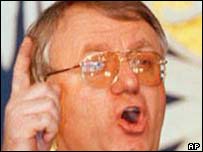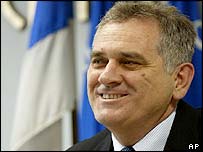 |
The Gravedigger of Serbia’s Reform Process
by Davor Pašalic
When Vojislav Šešelj, leader of the Serb Radical Party (SRS), surrendered himself to The Hague in February 2003, many believed this meant the end of his ultra-nationalist party.
 By the end of that year, however, his deputy was the most popular Serbian politician and the party the strongest in Serbia. It is the Serbian voters who made that happen. In the presidential elections of November 2003 Nikolić won the largest share of the vote, but failed to become president due to the poor turnout. In the December 2003 parliamentary elections, the SRS won 28% of votes (compared with less than 9% in the elections of December 2000, the first after Milošević’s fall) and 82 out of 250 seats in the Serbian parliament. By the end of that year, however, his deputy was the most popular Serbian politician and the party the strongest in Serbia. It is the Serbian voters who made that happen. In the presidential elections of November 2003 Nikolić won the largest share of the vote, but failed to become president due to the poor turnout. In the December 2003 parliamentary elections, the SRS won 28% of votes (compared with less than 9% in the elections of December 2000, the first after Milošević’s fall) and 82 out of 250 seats in the Serbian parliament.
The Radicals did not have enough seats to form a government on their own, while other parties insisted that they would not enter into any coalition with the Radicals. This does not change the fact that the 51-year-old SRS leader is today Serbia’s most popular politician - and, many people fear, the potential grave-digger of the barely begun reform process.
 Nikolić’s nickname is indeed ‘Gravedigger’, because in his native Kragujevac he used to work as director of municipal public works, with responsibility for the local graveyards. He has been Šešelj’s political partner since 1990. The SRS was notoriously created by Milošević’s secret police as a weapon against parties of more democratic orientation. In 1991 Šešelj worked together with Milošević, advocated the expulsion of Croats from Vojvodina, and kept armed units in Croatia and Bosnia. He never hid the fact that the Serbian police had armed and trained 30,000 of his Chetniks for the fighting in Croatia and Bosnia. In 1991 Nikolić too spent several months in Slavonia [occupied Croatia], after which Šešelj nominated him a Chetnik vojvoda or commander. Nikolić’s nickname is indeed ‘Gravedigger’, because in his native Kragujevac he used to work as director of municipal public works, with responsibility for the local graveyards. He has been Šešelj’s political partner since 1990. The SRS was notoriously created by Milošević’s secret police as a weapon against parties of more democratic orientation. In 1991 Šešelj worked together with Milošević, advocated the expulsion of Croats from Vojvodina, and kept armed units in Croatia and Bosnia. He never hid the fact that the Serbian police had armed and trained 30,000 of his Chetniks for the fighting in Croatia and Bosnia. In 1991 Nikolić too spent several months in Slavonia [occupied Croatia], after which Šešelj nominated him a Chetnik vojvoda or commander.
At the start of Yugoslavia’s dissolution, the SRS was the main ally of Milošević’s SPS. The love affair between the two parties lasted until the start of 1993, when Milošević decided to appear on the international arena as a politician dedicated to peace - which was impossible to do in Šešelj’s company. The SPS hence denounced Š ešelj as the father of fascism in Serbia, a political monster, a war criminal and the personification of evil. Šešelj and Nikolić responded by targeting Milošević’s Achilles heel - his wife Mira - whom they portrayed as ‘the red witch from Dedinje’. Claiming that all state decisions in Serbia were in fact made by Mira Marković-Milošević, Šešelj and Nikolić continued to provoke the regime, including by starting fights in parliament.
Nikolić faithfully followed Šešelj, but in contrast to Šešelj’s theatrical behaviour he always kept his cool, displaying his emotions only in rare cases - as, for example, when told that Tomislav was a Croat name. In 1994 the police was called to remove the SRS from the parliament building; soon after Šešelj and Nikolić had been arrested in Kosovo for ‘illegal assembly’ and sentenced to two months in prison.
The war between the Radicals and the Socialists ended after elections in 1997, when the SRS again entered into coalition with Milošević, who after hesitating between Šešelj and Vuk Drašković opted for Šešelj. The Radicals got thirteen ministerial posts, and Šešelj and Nikolić became vice-premiers. When two years later the Hague tribunal charged Šešelj with crimes against Croats and Muslims, the Radical leader to everyone’s surprise decided to surrender to the court.
Nikolić’s arrival at the head of the SRS meant a change in the Radicals’ public style. Passionate nationalistic tirades were dropped, together with violent incidents and crude attacks on political opponents. Nikolić’s basic message was that the Radicals, and the entire Serb nation, were victims of unfair treatment from all sides. He still insists that the line Virovitica-Karlovac-Ogulin-Karlobag forms Serbia’s western border - i.e. that Croatia is in occupation of a substantial Serb territory - and envisages the return of Serbian army and police to Kosovo. However, according to Nikolić, ‘liberation’ of supposedly Serb lands will be realized ‘not by force, but through diplomacy’.
Nebulous promises
He is in favour of cooperation with The Hague - but in the first instance with ‘all those imprisoned there’. As for economic reforms, he advocates the opening of small and medium enterprises that would employ a large number of people. The state should also organize public works, such as the building of roads, railway lines and other infrastructure. ‘I am not against privatization, but we think that the existing arrangements should be revised’, he stated during the election campaign. He made a big stir by promising to reduce the price of bread to three dinars.
These nebulous promises, coupled with the affairs that dogged the DOS government, made the Radicals into Serbia’s strongest party. The SRS is unlikely to join a new government, but being in government is not the Radicals’ aim, since they would then have to do something about their electoral promises. On the other hand, if the other parties - DSS, G17 Plus and the SPO-New Serbia coalition - succeed in forming a government,1 it is likely that this would not last very long, due to the existence of a strong personal animosity between their leaders. The collapse of such a coalition would lead to new elections, which everyone believes would increase the Radicals’ share of the vote. The SRS, far from being dead, has turned out to be the party of the future.
That Nikolić’s ‘Europeanized’ Radicals have not changed since the time when they symbolized political extremism in Serbia is shown by Nikolić’s remark on television on the eve of the elections that he was not sorry that Slavko Ćuruvija, owner of the journals Dnevni telegraf and Evropljanin, was shot dead in 1999 on the day of the Orthodox Christmas. It is believed that Ćuruvija was murdered for opposing Milošević. No one has been charged with the crime. At the time Nikolić was a deputy prime minister, as was Š ešelj, who stated that Ćuruvija’s murder was an act of national honour. Nikolić clearly shares this view.
Translated from a longer article in Nacional, Zagreb, 6 January 2004
|